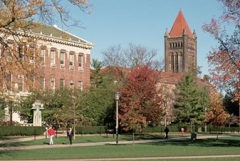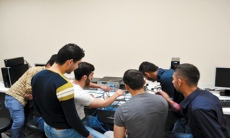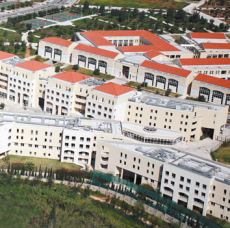Displaying items by tag: Universities
List of Universities In USA
YOUR STEPS TO STUDY IN THE USA:
Whether you plan to pursue a short-term or full degree program in the United States, this is what you need in 'Your Four Steps to U.S. Study'.
STEP 1: OVERVIEW
Research Your Options
The first step to studying in the United States is researching your options to find a college or university that best fits your needs. You shouldn't try to match yourself to the school, but rather find the school that matches you and your priorities and long-term goals.
Remember that no official ranking system exists for colleges and universities in the United States. The best college or university is the one that is best for you and meets your requirements—academic, financial, and personal.
At least 12 to 18 months prior to the academic year in which you hope to attend a U.S. college or university, you should begin your research. Start by answering these basic questions and looking at the more specific 'define your priorities' pages under each level of study in this section:
•Why do you want to study in the United States?
•Where will you fit in best?
•Which colleges or universities will meet your needs?
•Will you need financial assistance?
•What are the application and financial aid deadlines?
•Where do you want to live in the United States?
Choose your level of study (e.g. undergraduate, graduate, etc.) to learn more about researching your options. Keep in mind that the schools you apply to must be certified by the Student Exchange Visitor Program. You can find a searchable list of certified schools on the Department of Homeland Security's Study in the State's website.
STEP 2: OVERVIEW
FINANCE YOUR STUDIES
Finance Your Studies
Invest in yourself! The cost of living and studying varies across the United States. With the right amount of planning and research, pursuing a U.S. higher education can be made affordable with high returns on your investment.
Start your financial planning as early as possible. Each year international students receive significant amounts of financial assistance for their studies. However, competition is high. Applications for financial aid go together with applications for admission.
When looking into studying in the United States, evaluating your finances should be one of the first things you do. As with any investment, you need to evaluate what's best for your educational and career goals and what you are willing to spend.
U.S. institutions offer a wide array of programs with a wide array of tuition and fees. The United States is a large country and the cost of living varies greatly from place to place. You need to assess your funding and what you are able to spend on your education and living expenses.
Choose your level of study (community college, undergraduate, graduate, short-term, English language) to learn more about financing your options.
STEP 3: OVERVIEW
Complete Your Application
You've now reached Step 3: Complete Your Application. This step covers the general application requirements for U.S. colleges and universities.
Applying for U.S. study is a task that takes time and concentration as each application is different and involves collecting recommendations, writing essays, and routing the results of required standard examinations. Plan to give this step the time it deserves for a successful result.
Choose your level of study to learn more about completing your application.
STEP 4: OVERVIEW
Apply For Your Student Visa
You've now reached Step 4! Applying for your U.S. student visa. This next step will cover F, J and M student visa types.
Information pertaining to visas and travel can be found on the U.S. Department of State's Bureau of Consular Affairs website and the U.S. Department of Homeland Security's Study in the States.
Choose your level of study to learn more about applying for your student visa.
Best credit-building strategies after graduating college
There are many ways to build your credit, whether you’re working full time, freelancing or traveling
please Click here, this link might be usful fore you!
LIST OF UNIVERSITIES IN THE USA
Study In Germany
Germany is one of the most attractive locations for international students worldwide. There are many different kinds of universities, which all offer excellent quality. With so many to choose from, it's not always easy finding the right one. We help you understand what's what and show you how you can study in Germany in eight short steps.
There are over 380 officially recognized universities throughout Germany, and they offer a total ofover 17,000 study programs.
Steps to studying in Germany
Finding a university
Germany has public and private universities. They are usually divided into universities, universities of applied sciences and colleges of art, film and music. About 95 percent of the universities are financed by the government and are therefore state-funded. Only 5 percent of the institutions of higher education are private universities. The vast majority of students are enrolled in state-run universities. Anyone studying at these universities pays no or only a nominal amount oftuition fees.
Private universities, which are government approved or recognized, are generally universities of applied sciences. Students appreciate the small study group sizes, the close link to industry and the international focus. Anyone looking to study at a private university may need to pay very high tuition fees. In addition, the degrees are only recognized on the international job market if the private university is officially recognized.
Admission requirements
Anyone wanting to study at a university in Germany needs a so-called "Hochschulzugangsberechtigung" (HZB), or higher education entrance qualification. This lets applicants show that their educational background or professional qualification allows them to study in Germany, i.e. they have the necessary higher education entrance qualification to register for a course. An international higher education entrance qualification lets you study at a German university, provided that the international certificate of education is recognized as higher education entrance qualification in Germany.
Check the requirements
It is important to make sure that you are aware of the recognition requirements. If the certificate of education is recognized as a higher education entrance qualification in Germany, this recognition may apply for all courses (general qualification) or for certain courses (subject-specific qualification). Two to three semesters of study in the home country may be recognized as a higher education entrance qualification in Germany, depending on the country of origin.
Assessment test as part of a preparatory course
If your international higher education entrance qualification does not directly qualify you for admission to study in Germany, you can participate in a preparatory course at a German university. This is where you, together with other international students, develop the technical and cultural requirements to successfully study in Germany. The preparatory courses offer different core subject areas, such as medicine, technology or economics. They generally end with the assessment test after one year. After successfully completing the assessment, graduates are permitted to study the subjects that correspond to the subject areas in the preparatory course anywhere in Germany.
German language skills
The language of instruction at German universities is German in most courses. So you will need an adequate knowledge of German and must be able to demonstrate this knowledge in order to participate in the course. This does not generally apply for students in international courses or certain post-graduate courses. Anyone only wanting to study in Germany for one or two semesters may also not be required to provide evidence of their knowledge of German.
A good idea is to check with the relevant university'sInternational Office.
International office
Every university has an International Office (or Akademisches Auslandsamt). It is the central contact for international students and those interested in applying for a course.
Every university or university of applied sciences in Germany has an Akademisches Auslandsamt (AAA) or International Office (IO). They help international students and those interested in applying for a course to resolve all organizational issues relating to their studies. In particular, International Offices provide advice and support international students in the following topics:
- Course offer and course organization
- University entrance qualification
- Language proficiency
- Application and admission
- Dates and deadlines
- Course preparation and course entry
- Course fees and financing your studies
International Offices hold frequent introductory and orientation events. This helps international students familiarize themselves with the institutions and the processes at the university. Some International Offices have also established mentor programs. In these programs, local students provide support for international students. They help answer questions on the course, dealing with the authorities and everyday problems.
Financing your studies
Germany is not expensive in a European comparison. However, secure funding is very important for the success of your studies. The associated costs at a glance.
International students completing their entire (or part of their) course in Germany need to consider different costs. To get a better overview, you can distinguish between education and living expenses.
Education expenses and tuition fees
The semester fee is generally payable at all universities and for all students in Germany. It has nothing to do with the course fees, and is compiled of fees for the student union and for the student administration (AstA). At many universities the semester fee also includes a semester ticket for local public transport. The actual amount differs for each university, but it will be somewhere between 100 and 250 euros. The semester fee needs to be transferred on enrolment for the course, before the start of every new semester. Whether there are any additional costs for course material or textbooks depends on the specific course.
THE SEMESTER FEE AT THE UNIVERSITY OF COLOGNE IN THE 2014/15 WINTER SEMESTER IS COMPRISED OF:
Student administration: EUR 8.77
University sports activities: EUR 1.75
Semester ticket: EUR 162.80
Faculty allocation: EUR 2.10
Student union: EUR 59.00
Total: EUR 234.42
Visa application
International students often need a visa to travel to Germany. This depends on the country of origin and how long you want to stay.
International students looking to study in Germany will generally need a visa. This excludes students from the European Union (EU), the European Economic Area (EEA) and Switzerland. These students only require a valid ID card or comparable identification to travel to Germany. Students from these countries can register at the city's registry office as soon as they have found an apartment. This is where they will receive a residence permit for study purposes.
There are also a number of countries for which students can obtain their necessary residence permit for study purposes after their arrival. These include Australia, Israel, Japan, Canada, New Zealand, South Korea and the United States of America. It also includes the following countries, provided that the student does not intend to work in Germany before or after completing their studies: Andorra, Brazil, El Salvador, Honduras, Monaco and San Marino.
Visa process for international students
International students from other countries generally need to apply for a visa before arrival. Please contact the German embassy in your home country and apply for a student visa or an applicant visa. Anyone with written approval for preparatory study measures or a university place from a university can apply for a student visa. Anyone who is still waiting on the notice of admission or who has to sit an entrance examination will need to apply for an applicant visa. Once you arrive in Germany, you will need to submit your visa to the foreigners' authority at the study location in order to convert this to a residence permit for study purposes.
It often takes several months for a visa to be issued. It is therefore important to apply for an applicant visa as soon as possible so that you can arrive before your course commences. You should not wait to receive confirmation of a university place, as the notice of admission arrives very late in Germany. It is preferable to apply for an applicant visa with the university's confirmation of application and then convert it to a residence permit for study purposes in Germany.
Documents required for a visa application
The best course of action is to find information on the Federal Foreign Office's website or directly from the German embassy in your home country; but, in general, you will need the following documents:
- a valid passport
- the confirmation of application from the university (applicant visa) or the notice of admission from the university (student visa)
- proof of adequate funds for living expenses (proof of financial resources)
- health insurance coverage
PROOF OF FINANCIAL RESOURCES
Your proof of financial resources verifies that you can pay for your period of study. At least the living expenses for your first year in Germany must be fully financed. In general, around 7,908 euros of income or assets are required for the first year, or 659 euros per month. But evidence of higher amounts may also be requested. The German embassy in your home country will provide more information on the proof that needs to be provided. In principle, the following types of proof are possible:
- proof of parents' income and assets
- the Foreigners' Registration Offices receives confirmation that someone whose place of residence is in Germany commits to assume the costs for you
- a security sum on a blocked account
- scholarship from a recognized scholarship foundation
- Funding in accordance with the German Bundesausbildungsförderungsgesetz (BAföG - Federal Education and Training Assistance Act).
Finding accommodation
The accommodation situation for students is generally difficult, as cheap accommodation is hard to find. The monthly rent is the biggest item in themonthly expensesand costs students an average of 298 euros per month. Regional differences apply: The situation is most difficult in the major cities in western Germany and in the traditional university cities such as Heidelberg, Tübingen or Freiburg. By contrast, the situation is more relaxed in eastern Germany, where the average rental prices are lower.
Living expenses
Living expenses in Germany are slightly above average in a European context. They are below those of countries such as Denmark, Luxembourg or Switzerland, but are quite high compared to countries such as Asia, Africa or Latin America.
PRICE OVERVIEW
1 loaf of bread: EUR 1.20 - 3
1 kilo of apples: EUR 2
1 kilo of potatoes: EUR 1
1 liter milk: EUR 0.60 - 1
1 bottle of mineral water (0.75 liters): EUR 0.30 - 0.80
1 cup of coffee (in a café): EUR 2.50
1 beer (in a pub): EUR 2 - 3
1 pizza in a restaurant: EUR 4 - 6
1 pair of shoes: EUR 30 – 100
1 T-shirt: EUR 7 - 50
1 pair of trousers: EUR 30 - 100
1 cinema ticket (student discount): EUR 5 - 8
1 theatre ticket (student discount): EUR 6 - 30
1 ticket to a museum (student discount): EUR 2 - 8
A German student's average monthly budget amounts to 864 euros. This includes the rent, travel expenses, costs for food, clothing, learning material, healthinsurance, phone, Internet, radio and television fees and expenses for leisure activities. It does not include the semester fee, which needs to be paid prior to every semester as part of re-registration. This means that higher costs arise at the start of the semester. International students have significantly fewer funds than their German counterparts and have to finance their everyday activities with an average of 725 euros.
WHAT DO GERMAN STUDENTS PAY MONEY FOR EVERY MONTH?
Rent (incl. ancillary expenses): EUR 298
Food: EUR 165
Clothing: EUR 52
Travel expenses (car/public transport): EUR 82
Health insurance and medical costs. Medication: EUR 66
Phone/Internet/Radio/TV fees, postage: EUR 33
Course materials/learning materials (books, etc.): EUR 30
Leisure, culture and sports: EUR 68
Total: EUR 794
Top Universities In Germany
Top 10 German Universities to study Medicine,Pharmacy,Electrical Engineering,Industrial Engineering,Mechanical Engineering,Material Engineering,Computer Sciences,Architecture,Language and Literature.
with holding 6 decades of tradition in education and research. This department aims to overcome the 21st century’s medical challenges in the region and beyond. Into establishing such a renome, this department has undergone a series of struggles to establish a central scientific institution, emphasizing research and supporting and promoting research agendas. Nowadays, the university is a vivid and interactive environment of internationally recognized research institutions, luring students from all around the world.
Provided for its fame in the research profile, the Lübeck Medical School is ready and set to fight the demons of the 21st century’s medicine. Focusing strongly yet hardly solely on 1) Infection & Inflammation, 2) Brain, Behavior and Metabolism, 3) Medical Genetics and 4) Biomedical Technologies this educational institution meet the standards of excellence.
The students are provided with an effective cocktail of:
- Technical knowledge needed for the future
- Practical capabilities & skills
- Scientific work
- Social and ethical skills
As for being among the oldest private Universities in Germany, founded in 1983 the Witten/Herdecke University is recognized widely to be highly prestigious. Around 1200 undergraduates study Medicine, Nursing Science, Dental Medicine, Economics, Philosophy and Culture. As for enrollment criteria, students have to succeed on explaining why they’ve made the certain choice for the certain profession during their interview. The astonishing part of this conquest is the fact that the interviewers attribute the merit to students personality opposed to their great grades. As aforementioned, this University is private therefore the tuition fees go up to 400 and 1000 euro a month. Yet, the excellent studying conditions at UWH are not for free: students have to pay between 400 and 1000 euro a month in academic fees. However, the international students can always apply for grants and scholarships.
Following a merger of the existing Technical University, the Teacher Training College and the Medical School in the 1993, the University of Magdeburg is one of the youngest Universities in the state. The Medical School provides for around 1300 trained experts in dealing with a wide range of serious illnesses in the region of Saxony. A special emphasis is laid on the close cooperation between teaching staff and students. Around a year, this institution hosts around 45000 stay-in patients and numerous others in and out of the facility. With all this being said, the institution offers excellent practice oriented medical education for eager students.
The Munster University was founded in 1780, withholding a long-lasting tradition spread over its seven facilities hosting 15 departments and offering 250 different courses of study. The University takes pride in their exquisite staff of 5000 certified experts and 37 000 prospective students. Additionally, it has around 400 partnership agreements with various academic institutions all around the world. The University runs by valuing knowledge, research and curiosity.
The Würzburg University was established more than 4 decades ago by the Prince – Bishop Julius Echter von Mespelbrunn and the Prince Elector Maximilian Joseph. The University department facilities and its additional institutes are all situated within the old town allies. The University hosts a modern library, a new liberal art campus and several research institutes among others. Of the 25.000 students around 1000 students come from the international domain.
The University of Tubingen is one of the oldest classical Universities, situated in an optimal university town. It is internationally recognized for its success in medicine, natural sciences and humanities. The university is associated with some Nobel laureates, especially in the fields of medicine and chemistry. The Medical department including the clinic, the scientific institutes and the theoretical facilities makes for the greatest medical training institute in the Baden-Württemberg region.
The University of Freiburg belongs to the long tradition of successful teaching in humanities, social sciences and natural sciences. The University operates under 11 faculties luring students from every corner to join the quality and expertise. The Freiburg medical center has a staff over 10 000 professionals taking care of around 58 000 patients in need of medical attention. The University Medical Center believes that basic science and clinical research are prerequisites to realize the newest medical expertise and treatments and therefore encourages ongoing and new research by its physicians.
Leipzig University of Saxony is the second-oldest university in Germany. Famous predecessors of the nowadays prospective students of this establishment include Leibniz, Goethe, Nietzsche, Wagner, and Angela Merkel adding to the composition also nine Nobel laureates associated with the Leipzig University. The Faculty of Medicine is an educational institution of over 3,000 students in human medicine and dentistry and operates closely with the Leipzig University Hospital. The Faculty of Medicine together with the University Hospital is among the greatest medical institutions in Saxony hosting 48 clinics and institutes operating in five separate departments. The motto of Leipzig Medical School is research, teaching, healing – a tradition of innovation.
Top 8 German Universities to Study Pharmacy
Pharmacy has been taught at TU Braunschweig since 1835. Today, the campus hosts over 600 pharmacy students. It is one of largest centers of pharmacy among German universities and the only one in the state of Lower Saxony. The study of pharmacy centers around the scientific bases of medical drugs ranging from the preparation of bioactive substances, their chemical analysis and pharmaceutical formulation to their effects on humans. Students also gain insight into different aspects of current research carried out at the pharmaceutical institutes under the common research focus “Bioactive molecules and drug development”. Major research themes include, for example, rational drug design, molecular pharmacology of cardiovascular diseases, and the development of colloidal microparticlesas drug delivery systems and the biotechnology of bioactive compounds from plants.
Philipps-Universität is not only a German university drenched in tradition, but also the oldest university in the world. It started as a Protestant institution in 1527. For nearly five centuries now the University has served as THE place of research and teaching. Currently there are nearly 25,000 students studying in Marburg of which 12 percent come from all over the world. Except for the engineering departments, the University hosts almost all the other scientific fields of study. The different disciplines are assigned to different faculties. Philipps-Universität is considered to be the cradle of prosperity and emancipation in the Marburg region of Germany.
Founded in 1456, the University of Greifswald was and is one of the oldest academic institutions in Europe taking pride in decades of tradition. Over 12,000 students from all over the world receive the most modern academic guide ways and exciting research opportunities in a learning- friendly environment. Research priorities at the University of Greifswald are in the life sciences, physics and geosciences, cultural interaction in the Baltic/Nordic region, as well as law and economics. The students engage in inter-disciplinary collaborations across faculties and aim for excellence in both research and teaching.
Goethe University Frankfurt, positioned among the top international research universities, offers a wide variety of academic programs, a diverse group of research institutes, and a focus on interdisciplinary approaches to solving complex problems. The university is named after Johann Wolfgang von Goethe, the Frankfurt-born polymath renowned for his exceptional contributions to literature, science, and philosophy. In the department of Biochemistry, Chemistry and Pharmacy, 32 professors are involved in research and teaching. They are supported by 215 permanent members of staff and are involved in teaching for more than 1.850 undergraduate and 500 PhD students and postdoctoral fellows in four different subjects: Pharmacy, Chemistry and Biochemistry.
Among the great study conditions and circumstances the University of Freiburg offers a great practical approach to its students. The pharmaceutical bioinformatics lab at the Institute of Pharmaceutical Sciences develops algorithms and software for pharmaceutical research. The fields of research at this institution include the modeling of molecular interactions, prediction of biological effects of molecules, and identification of potential new drug agents. Also, different reactions and effects of therapeutics can be analyzed and explained. A further area of work in the lab is the evaluation of the vast amounts of data, produced by up-to-date measurement methods and processes of systems biology.
Situated in the city of Kiel Germany, the University of Kiels foundations go way back 1665. The institution was found and established as the Academia Holsatorum Chiloniensis by Christian Albert, Duke of Holstein-Gottorp. There are approximately 24,000 students studying in the University of Kiel today. The University of Kiel is the largest, oldest, and most prestigious in the state of Schleswig-Holstein. The Institute of Pharmacy belongs to the department of Pharmacy and is divided into the sub-departments Clinical Pharmacy, Pharmaceutical Biology, Pharmaceutical Chemistry and Pharmaceutics and Bio pharmaceutics.
Interdisciplinary research training is the key to the success of tomorrow’s life scientists, as the motto of the University states. The University of Würzburg provides a world class environment of research institutions, which have a long and successful tradition of cooperation across faculties. The Graduate School of Life Science results from a common initiative of the Faculties of Biology, Medicine, Chemistry and Pharmacy, Physics, and Philosophy. It is this interdisciplinary spirit that propelled Würzburg to among the top four German Universities in the Life Sciences.
The Institute of Pharmacy at Freie Universität Berlin is one of the largest pharmaceutical training facilities in Germany. In Berlin-Brandenburg Freie Universität is the only university that has the discipline of pharmacy. Teaching and research are carried out in the fields of pharmaceutical biology, pharmaceutical chemistry, clinical pharmacy, pharmacology, and pharmaceutical technology. The institute focuses on drug development and testing, the analysis of natural substances, alternative testing methods, and innovative drug delivery systems.
Top Universities in Germany to study Engineering ( general head line)
Top 5 Universities in Germany to study Electrical Engineering
The Darmstadt University of Technology, whose official name is “Technische Universität Darmstadt”, (abbreviated TU Darmstadt) in Darmstadt, plays a significant role among German universities. It is one of Germany’s leading universities and well known internationally for its outstanding achievements in the areas of engineering, political science and computer science.As an institution it provides excellent research in selected fields to face the challenges of the new millennia guided first hand by experts in the field. In electrical engineering students often work on projects which give them the opportunity to use their theoretical knowledge in practical applications. In their last year the students are asked to work on their bachelors dissertation encouraged to be creative and genuine.
As the only technical and engineering university in Rhineland-Palatinate, the TU has acquired a considerable reputation since its founding in 1970. With around 14,200 students in twelve subject areas the University of Kaiserslautern has a manageable size, the close contact with professors and excellent service guaranteed. Electrical Engineering and Computer Engineering are offered as two separate graduate courses with varying technical orientation. The sound basic education in the four-semester undergraduate program is followed by the graduate program with technical specialization in one of the seven majors.
The TUM is one of the best universities in Europe regarding excellence in research and teaching, interdisciplinary methods and talent drawn from them. The strong collaboration amidst various companies and several other academic institutions around the world make for an optimal international environment. TUM is one of the first three Universities of Excellence in Germany. The bachelor’s degree program in Electrical Engineering and Information Technology is divided into two study phases. In Part I, the first four semesters, students learn the fundamental principles of the following subject areas: Electrical Engineering (28 credits), Mathematics (32 credits), Physics (24 credits), Signals and Systems (20 credits), Information Technology (16 credits). In Part II, the second phase of study follows on from the fundamental principles. During semesters 5 and 6 students build on the knowledge gained in the first four semesters. They will be expected to accomplish the following: Engineering Practice (12 credits), Soft Skills (6 credits), Bachelor’s Thesis (12 credits), Individual Advanced Modules (30 credits)
The RWTH Aachen found in 1880, has a long lasting tradition of excellent education comprised of nine faculties among which, the Faculty of Engineering. The coverage of the RWTH Aachen engineering studies corresponds with the idea of expanding the electrical engineering potential. Students receive intensive basic studies – the mathematics, computer science, and electrical engineering education cannot be beat within Germany. Students begin their studies focusing on focus on mathematics, computer science, and the elementary stage of electrical engineering. The Basics continue for three to four semesters. The curriculum is quite mathematically challenging to ease up their way towards the essentials of technical principles and structural concepts.
Since its foundation in 1967, the youngest university in Baden-Württemberg showed a remarkable performance. Currently around 9500 students spread over the faculties of medicine, engineering and computer science, mathematics, sciences, economics and natural sciences. Its motto states “Innovative technology is in need of modern software and hardware solutions, but it must also take into account the people who will deal with this technique. Conversely, it is an inspiration for innovative technical mechanisms and algorithms human thought and action patterns.
Top 5 Universities in Germany to study Industrial Engineering
Since the beginning of 2009, Clausthal University of Technology has been a member of Niedersächsische Technische Hochschule, NTH. Combining the engineering and scientific expertise of Lower Saxony, the University is part of the best technical universities in Germany. Research and education at Clausthal University of Technology are currently focused on Energy and Raw Materials, Natural Science and Materials Science, Economics, Mathematics, Computer Science, Mechanical Engineering and Process Engineering.
The research interests of the Brandenburg University of Technology Cottbus-Senftenberg focus on environment, construction, energy, material and information and communication technology. And thus BTU claims: We live Science. The creation of key technologies through innovation as well as the creation of knowledge through research and education is decisive factors in a global market. It has been highlighted by the European Commissioner for Science and Research, which it will be necessary to develop strong regional poles of research, innovation and education, which are intensively linked to regional as well as to global economic aspects.
The Technical University of Ilmenau, located in the 25,000-inhabitant town of Ilmenau, on the northern slope of the Thuringian Forest, offers as a small university for their students and staff favorable conditions for study and work, which may not necessarily hold their big sisters. Short distances, small seminars and lectures, the possibility of personal contact between students and teachers and effective networking of scientists are just some of them.
Creative inspiration between Rhine and Ruhr: the University of Duisburg-Essen (UDE) is located in the European region with the highest density of institutions of higher learning. Created in 2003 by the merger of the universities of Duisburg and Essen, the UDE is the youngest university in North Rhine-Westphalia and one of the ten largest universities in Germany. As part of this merger the current shape of the engineering faculty has been created; it is unique in Germany. The four existing departments pursue research on a high, internationally recognized level. With about 80 professorships and more than 9,000 students this department belongs to the largest in Germany.
Following a merger of the existing Technical University, the Teacher Training College and the Medical School in the 1993, the University of Magdeburg is one of the youngest Universities in the state. In order to satisfy the challenges arising in a modern information society, the EIT offers a broad range of modern and interdisciplinary program of study, some of which are conducted in close cooperation with the other faculties at Otto von Guericke University and which open up excellent career prospects to our students. In addition, electrical engineering and information technology in Magdeburg stands for research strength and innovative projects.
Top 5 Universities in Germany to study Mechanical Engineering
Since the beginning of 2009, Clausthal University of Technology has been a member of Niedersächsische Technische Hochschule, NTH. Combining the engineering and scientific expertise of Lower Saxony, the University is part of the best technical universities in Germany. Research and education at Clausthal University of Technology are currently focused on Energy and Raw Materials, Natural Science and Materials Science, Economics, Mathematics, Computer Science, Mechanical Engineering and Process Engineering.
U Braunschweig is the oldest institute of technology in Germany: the cornerstone of our modern university was already laid in the year 1745 with the Collegium Carolinum. The bachelor degree course Mechanical Engineering was established in the winter semester 2008/09. The professionalization modules include a non-technical optional module (4 credits) and the project report (6 credits). The interdisciplinary project work is done in teams and is particularly intended to help the students develop the following skills: development, implementation and presentation of concepts as well as preparation and formulation of results in teams.
The research interests of the Brandenburg University of Technology Cottbus-Senftenberg focus on environment, construction, energy, material and information and communication technology. And thus BTU claims: We live Science. The creation of key technologies through innovation as well as the creation of knowledge through research and education is decisive factors in a global market. It has been highlighted by the European Commissioner for Science and Research, which it will be necessary to develop strong regional poles of research, innovation and education, which are intensively linked to regional as well as to global economic aspects.
Following a merger of the existing Technical University, the Teacher Training College and the Medical School in the 1993, the University of Magdeburg is one of the youngest Universities in the state. In order to satisfy the challenges arising in a modern information society, the EIT offers a broad range of modern and interdisciplinary program of study, some of which are conducted in close cooperation with the other faculties at Otto von Guericke University and which open up excellent career prospects to our students. In addition, mechanical engineering in Magdeburg stands for research strength and innovative projects.
The RWTH Aachen found in 1880, has a long lasting tradition of excellent education comprised of nine faculties among which, the Faculty of Engineering. The coverage of the RWTH Aachen engineering studies corresponds with the idea of expanding the electrical engineering potential. Students receive intensive basic studies – the mathematics, computer science, and electrical engineering education cannot be beat within Germany. Students begin their studies focusing on focus on mathematics, computer science, and the elementary stage of electrical engineering. The Basics continue for three to four semesters. The curriculum is quite mathematically challenging to ease up their way towards the essentials of technical principles and structural concepts.
Top Universities in Germany to study Material Engineering
Owning a reputation of being one of the leading technical universities in Germany, partly for its engagement in pioneering work, the Technical University of Darmstadt come first in the wide range of options to study electrical engineering in the region. The principle of the indivisibility of teaching and research is common to all German universities. Mention must be made, however, that research at the TU Darmstadt has had a long and particularly successful tradition to date.
Understanding and controlling the production, processing and application of materials are some of the most important challenges in today’s globalized world. The Master’s degree in materials engineering at Saarland University aims to provide students with a practical and applications-driven postgraduate program that covers advanced aspects of materials technology and engineering.
The core of the course offerings is the Bachelor’s degree in Materials Engineering opposed to the other Universities that have it only as a master’s program. The materials engineer deals with all issues of development, production, processing and recycling of materials and materials. A great approach closer to the industry facilitates future employment and one gains quickly an idea about the requirements and skills required in their future careers. Developing a carrier on this particular matter obtaining a Bachelor of Science may be advanced in this university also with a related master’s degree.
The Elite Master’s Program in Advanced Materials and Processes (MAP) is an international, English language degree program which aims to train excellent Bachelor’s graduates from the fields of Materials Science and Engineering and Chemical and Biological Engineering or related backgrounds. The interdisciplinary program is funded by the Elite Network of Bavaria and is hosted at the School of Engineering at the Friedrich-Alexander-University of Erlangen-Nuremberg.
Top 6 Universities in Germany to study Computer Sciences
The Computer Science (CS) program at Jacobs University provides a first class education which focuses on the understanding of these principles and how they are applied in practice. Computer Science is a challenging and fascinating discipline with ample job opportunities. Almost all modern goods either directly incorporate computer systems or information technologies drive the manufacturing process. While computer technologies come and go at a fast pace, there are a number of fundamental principles underlying those technologies.
The Hasso Plattner Institute opened its doors to students in the winter term of 1999/2000. It is the only university institute in Germany that offers an undergraduate (bachelor) and a graduate (master) course of study in IT-Systems Engineering. Students acquire the knowledge to conceptualize, develop and implement large, highly complex and cross-linked IT systems. The bachelor and master degree courses are designed for highly talented young people who are looking for an innovative, practice- and engineering-oriented computer science studies at a university level.
The institute’s special characteristics are its engineering orientation, the teaching of soft skills and the early intensive integration of industrial projects into the studies.
The University of Ulm is chronologically the ninth in Baden-Wuerttemberg. The Faculty of engineering and computer sciences has broadened its subjects as well: in addition to the departments of engineering and computer science, the psychology department joined us in 2009.
The combination of these three subjects may appear unusual at first glance, but it is exactly what gives the Faculty its strong and unique character. Innovative technology demands modern software and hardware solutions, which includes taking into account the person who will be handling the technology. It goes the other way as well: human patterns of thought and behavior can inspire ideas for innovative technological mechanisms and algorithms. Current successful projects demonstrate how new fields of research arise when these three subjects come together.
The RWTH Aachen found in 1880, has a long lasting tradition of excellent education comprised of nine faculties among which, the Faculty of Engineering. The coverage of the RWTH Aachen engineering studies corresponds with the idea of expanding the electrical engineering potential. Students receive intensive basic studies – the mathematics, computer science, and electrical engineering education cannot be beat within Germany. Students begin their studies focusing on focus on mathematics, computer science, and the elementary stage of electrical engineering. The Basics continue for three to four semesters. The curriculum is quite mathematically challenging to ease up their way towards the essentials of technical principles and structural concepts.
Idyllically situated on the banks of the River Inn, on a green campus, on the fringes of the Passau Old Town, lies the newest university in Bavaria. Since being founded in 1978 it has developed into one of the best academic addresses in Germany as regularly confirmed in the rankings: in Computer Science, Economics, Law, and International Cultural and Business Studies, Passau is one of the top German universities. Computer Science is a special tip: excellent academic staff provide intensive supervision of the highest academic standard. Innovative teaching concepts as, for example in the teacher training courses and in theology complete the picture. All five faculties are superbly equipped, intercultural orientation, and performance and practice related. Their special strength lies in the interdisciplinary interlinking of research and studies.
Kaiserslautern is one of the largest IT locations in Germany with the Department of Computer Science forming its core. Since the department was founded in 1974 three renowned research institutes have evolved from its successful international work. With 24 professors the department covers all areas of computer science and can embrace the importance of computer science as a key skill for virtually all sciences at the TU. The department can also take on the central role of computer science research and development in Kaiserslautern in the future. As far as teaching is concerned, the department attaches particular value to excellent mentoring, a good partnership with the students and high quality lectures and seminars.
Top 10 Universities in Germany to study Architecture
This University is rather quality oriented with its 1600 international students wandering round the campus to prove that. Education wise, it incorporates a combination of research orientation of a traditional Technical University and the more advanced application oriented programs in engineering, social science, economics and health care. Overall, the BTU Cottbus-Senftenberg offers an excellent opportunity for students willing to achieve more in life. The Faculty of Architecture has been offering ZEFA-accredited Bachelor’s (BA) and Master’s (MA) degrees since 2002, and was subsequently approved as a course provider by the Ministry of Science, Research and Culture (MFWK) in Brandenburg. The great thing about the way the university operates lies in that the department collaborate closely into coming up with all field activities and structural planning. This way, students get to practice what they’re preached in various fields.
Founded in the 1761, the Stuttgart State Academy of Art and Design (Staatliche Akademie der Bildenden Künste Stuttgart) has a venerable tradition in academic excellence regarding the fields of fine arts and design. A modest number of students, around 850 overall, it is however recognized not only as an academy but also a University. In the State of Baden-Württemberg it is a prominent institution and an education center for both fine (e.g. painting, sculpture) and applied arts (e.g. architecture, design). This dualistic approach to arts is the pride of this institution, which will continue to cultivate and develop in the future.
Of what used to be a museum serves now for its purpose and as a facility to educate the prospective students of Architecture. The RWTH Aachen found in 1880, has a long lasting tradition of excellent education comprised of nine faculties among which, the Faculty of Architecture. It comprises 22 chairs and institutes including art history, structural design or load carrying construction. The University aims for quality over quantity therefore its relatively low number of around 1,500 students enrolled in the faculty.
In the Bavarian region, the TUM Munich’s Department of Architecture is the only University level educational institution. The Faculty hosts over 1200 students segregated in over 26 Departments offering a broad range of subjects lectured by over 170 professionals relevant to the field. There is a close collaboration between the research oriented University and the wide spread High tech industrial partners over Munich. With this being said, this Faculty not only offers and exquisite road to education but also potential lob opportunities for their students in the future. The University owns merit prizes on the field of Architecture such as:
- Deutscher Architekturpreis – German Prize for Architecture
- Deutscher Städtebaupreis – German Urban Planning Prize
- European Architecture + Technology Award
- Mies-van-der-Rohe Prize
- RIBA Award
The Faculty of Architecture as part of the Stuttgart University goes way back withholding 19 centuries of tradition. Reforms and revolutionary standards started being applied started in the beginning of the 20 Century. Under the patronage of the Professors Richard Döcker and Rolf Gutbrod, the facility was redone under the modern architecture spirit followed by a new subject, the field of Urban Planning, essential in the educational and research domain. With over 16 institutions nowadays as well as expert lecturers German and international, the University of Stuttgart is recognized as one of the top Universities in the state. In fact, it’s widely known for the extraordinary combination of architecture and Urbanism as a whole field, offering students the opportunity a broader and contemporary outlook on this certain field.
Back in the 18 century, the “Higher Trade School of Hannover” which started with 64 students, today is a University of over 22 000 students enrolled in economics, law, humanities, natural sciences and engineering. In becoming an architect, one needs to be a bit of everything, an engineer, a historian an artist and sociologists, as the Faculty motto suggests. The main focus of this Faculty’s program is urban planning, cultural landscape and design planning. Leibniz Universität Hannover is the only university in the North of Germany offering training and research in landscape architecture and environmental planning.
Since its foundation in 1968, TU Dortmund University has been the correlation between nature and technology, the endless war towards progression of the humanity. It has established a unique combination of fields in the natural sciences and engineering, the social sciences and the humanities with a broad ranged curriculum taught by experts, German and foreign. The international character of the university is a huge priority. Apart from the German student that have enjoyed its benefits for decades, there are over 3200 international students currently enrolled in the University from over 100 different countries.
The faculty of Architecture, together with the faculties of Art and Design, Civil Engineering and Media, provides a platform for inter-disciplinary discourse on matters involving design and construction. The main goal of this institution is to create conceptual and open-minded architects, creative designers and skilled managers who will make their way out on the harsh nowadays market. The faculty maintains an active student exchange program with more than 30 international partner institutes within the framework of European higher education and beyond. “Weimar” and “Bauhaus” are essential milestones in the course of modern architecture and the development of contemporary architectural teaching. Numerous symposiums and conferences, among which the International Bauhaus Colloquium, are organized by the faculty in elaborating contemporary architectural matters.
The Wupperthal University looks back on 100 years of tradition and history. Localized in a metropolitan area, the University campus is sited right in the middle of the city. Apart from offering superb educational alternatives, in all the fields as well as architecture, it provides also for a vibrant and dynamic lifestyle for the youth. Regarding research and innovations, the University is highly ranked promising not to break the tradition. The University is also very well connected, another true benefit for its dear students.
The symbiosis of Architecture and Landscape, commonly very rare around the state of Germany is the trade-mark of the University of Dresden, moreover the Faculty of Architecture. The University of Dresden in internationally known for its practice oriented teaching and genuine research. Balancing of the theoretical, artistic, technical and ecological aspects of our living environment is the basis for all work at the faculty.
The University policy is careful enough not to concentrate only on the theoretical course but also convey several excursions in order for their students to have the chance to rehearse their competence in small group projects, just like any other professional does in the real world.
Top 10 German Universities to Study German Language and Literature
The University of Mannheim is well known for its distinct profile, its business orientation and its international approach. Various rankings, awards and evaluations classify the University of Mannheim as one of the leading universities in Germany. Mannheim’s renowned Economics and Social Sciences Programs are closely intertwined with Humanities, Law, Mathematics and Computer Sciences. The University of Mannheim is mainly located in Mannheim Palace, the largest baroque palace in Germany. Since the fall semester 2011, the University of Mannheim and the University of Waterloo (Ontario, Canada) jointly offer the consecutive M.A. ‘Intercultural German Studies’. Students study one year in Germany and one year in Canada and earn a joint degree of both universities. The program offers a broad interdisciplinary framework for German language and literature studies.
The University of Augsburg campus is one of the most congenial places to study in Germany. Situated near the city centre of Augsburg, the campus is spacious without being overwhelming. The modern buildings, functional and yet architecturally appealing, blend into a landscaped park with grassy areas, a lake, fountains and several sculptures by contemporary artists. The University of Augsburg was founded in 1970. It is one of the new, modern universities in Bavaria, and with approximately 15,000 students it is of a manageable size. The University of Augsburg provides the ideal conditions for completing a degree program successfully and within a reasonable time frame. Ever since it was founded, the University has been committed to reform and innovation. Seven faculties have been established, each with long-term strategies for development and using the most up-to-date facilities available.
Located in the midst of the dynamic, hospitable metropolitan area of the Ruhr, in the heart of Europe, the Ruhr-University Bochum (RUB) with its 20 faculties, RUB’s disciplinary institutional units, is home to 5,000 employees and over 36,500 students from 130 countries. All the great scientific disciplines are united on one compact campus. The RUB is on its way to becoming one of the leading European universities of the 21st Century. Almost all courses are offered as Bachelor and Master Degree programs.
Founded in 1386, it is the oldest university in Germany and was the third university established in the Holy Roman Empire. Heidelberg has been a coeducational institution since 1899. Today the university consists of twelve faculties and offers degree programs at undergraduate, graduate and postdoctoral levels in some 100 disciplines. International students from some 130 countries account for more than 20 percent of the entire student body. The University Library is the main library of the university, and constitutes together with the decentralized libraries of the faculties and institutes, the integral university library system comprising approximately 6.7 million printed books.
The University is a technical college, educational entity, and research institution. An Either-Or has been imposed between these three possibilities. Within the ‘concept of the university’, however, these purposes constitute an inseparable unity. These purposes may not be separated from each other without both destroying the spiritual substance of the university and becoming stunted themselves. All three purposes are elements of a living whole. “The University Kassel, with its 17,000 students, 2,200 employees, its 18 departments, its institutes and its academic centers, offers academic programs with various admission and degree opportunities like Bachelor and Masters. The Hessen International Summer University (ISU) has become an internationally oriented
As a genuine “universitas” LMU Munich has the unique opportunity and a deep obligation to deal with the ever more complex questions facing humankind, society, culture, the environment and technology by creating interdisciplinary solutions. In terms of student numbers, the Faculty of Languages and Literatures is the largest faculty at LMU Munich. Conducting quality research at international level, the three departments and a number of interdisciplinary working groups offer a range of languages, literatures, and cultures that is unique in Germany, covering both living and historical languages. Research- and practice-oriented subjects, such as German as a foreign language, book studies, and media didactics, strategically prepare students for a broad and rich professional life in a society in which cross-cultural communication skills are among the most important qualifications.
The specific profile of the School of Language and Literary Studies is shaped by the combination of comprehensive Language and Literary Studies with classical Latin philology and by the modern languages of English, German, French, Italian and Spanish. One of the joint elements of teaching that define its profile is Teacher Education and the participation of all departments in the polyvalent Dual Major Bachelor’s Degree and Teacher Education degree programs. The departments are committed to the University’s core objective of promoting research-based Teacher Education, which they see as a task to be tackled throughout the University by all departments. This commitment is illustrated not only by the projects realized in the departments, but above all by their involvement in the Center for Teacher Education (German), which aims to ensure a fair balance between scientific disciplines and didactics. Outside the University, the School has numerous relationships with facilities within the City of Osnabrück and the rural district. For example, members of the School’s teaching staff play an active role in teacher education and training; projects are carried out with many local schools in which pupils and teachers are introduced to and involved in university life and the departments of the School of Language and Literary Studies.
Students will take the degree at Christian Albrechts University in Kiel. Kiel is a modern city on a beautiful inlet of the Baltic Sea, near the Danish border. Berlin, Amsterdam, or Copenhagen are within easy distance, and an overnight boat trip takes you to Oslo. Many water sports are available, including sailing and windsurfing. The curriculum includes language and culture courses from beginning to advanced levels at Christian-Albrechts-Universität zu Kiel, Germany. They are taught by experienced German language teachers and native speakers from the Kiel/Hamburg area. Students may also take advantage of the German tutors (usually students at the University in Kiel), who engage program participants in various extracurricular activities such as cooking, sports, going out and attending events around the city. The Intensive German Language program will run in conjunction with the International Studies Kiel program that fulfills International Studies major requirements. Interested students will have the option to take courses from both programs.
With its 260 institutes in nine faculties, RWTH Aachen is among the leading European scientific and research institutions. 37917 students in 126 courses of study are registered for the winter semester of 2012/13, including almost 5000 international students from more than 120 countries. Teaching at RWTH Aachen is first and foremost application-oriented. Its graduates are therefore sought-after as junior executives and leaders in business and industry.
The University of Siegen library currently primarily offers stock of relevance to the subjects taught at the university. In addition to print media, the range of digital resources is continually being expanded. Maintaining stock at 4 different sites means that the respective departments are guaranteed direct access the information relevant to their specialisation and topic. Any literature not held can be acquired via the interlibrary loan system. Key skills relating to targeted information searches are taught within the scope of a range of training courses.
Universities in Dubai
In the whole of Middle East, Dubai is seen as an Educational Hub for students to come and pursue higher education. The following Universities provide various courses in Engineering, Management, Technology and many other fields.
American university of Sharjah
French universities
Individuals choose France for their educational needs for a number of very good reasons. Because the French are so adamant of being able to offer students the highest in educational standards, you can always count on your chosen college and program to be among the best that you can find anywhere in the world. The people of France take their education exceptionally seriously, and it shows in the education that you can find across the country.
Plenty of money is spent on education in France, and if getting the prime education that you want and need is important to you, studying in France is definitely the perfect option.
It is often said that the who’s who of elite futures choose France to attain their education. Engineers, military leaders and many others all turn to the prime education system in France to acquire their knowledge of the industry. They turn to the colleges in the country because they know the fantastic learning opportunities that await them when they do.
The baccalaureate is the gold standard when it comes to getting into a French university; but getting into a “grande école” is a whole other story. Entry into many of the “grandes écoles” requires “bac+2” level, which is equal to the level of the third year of university studies. Entry into a “grande école” is usually available only for students who stay on in Lycée for two whole years after earning their baccalaureate.
The table below lists all public universities and private universities in France.
| Region +Town or city of main campus | University (Clickable links) |
Principal disciplinary fields | |
| Alsace Strasbourg |
Université de Strasbourg | A full range, including theology | |
| Mulhouse | Université de Haute Alsace | Arts, Sciences, Economics | |
| Aquitaine Bordeaux |
Université de Bordeaux Formerly Université de Bordeaux 1 Université Michel Montaigne Université Montesquieu Université Ségalen |
Science & technology | |
| Arts | |||
| Law, Economics, Social & political science | |||
| Medicine, social sciences, oenology | |||
| Pau | Université de Pau et du Pays de l'Adour | Arts, law, science | |
| Auvergne Clermont Ferrand |
Université Blaise Pascal | Arts, social sciences, science | |
| Université d'Auvergne | Medicine, law, economics, management | ||
| Brittany Rennes |
Université de Rennes 1 | Medicine, law, economics, philosophy, maths, life sciences | |
| Université de Haute Bretagne | Arts and social sciences | ||
| Brest | Université de Bretagne occidentale | Arts, law, science, medicine | |
| Vannes | Université de Bretagne sud | Arts, law & economics, science | |
| Burgundy Dijon: |
Universite de Bourgogne | Full range | |
| Région du Centre Orleans |
Université d'Orléans | Arts, Law and economics, science | |
| Tours | Université Rabelais | Full range | |
| Champagne Reims |
Université de Reims | Full range | |
| Corsica Corte | Université Paoli | Arts, law, science | |
| Franche Comté Besançon |
Université de Franche Comté | Full range | |
| Ile de France (Paris) Paris |
Université de Paris 1 Panthéon Sorbonne | Humanities, economics, law | |
| Université de Paris 2 PanthéonAssas | Law, economics, legal journalism | ||
| Université de Paris III Sorbonne Nouvelle | Arts & human sciences | ||
| Université de Paris IV Sorbonne | Arts & human sciences | ||
| Université Descartes Paris 5 | Social sciences, law, maths, medicine | ||
| Université Curie, Paris 6 | Science and medicine | ||
| Université Diderot Paris 7 | Arts, humanities, social science, medicine, science | ||
| Université catholique de Paris | Theology, arts, law, science | ||
| Saint Denis | Université Paris VIII Vincennes à Saint Denis | Arts, social sciences, economy, law, maths | |
| Nanterre | Université Paris Ouest Paris X Nanterre |
Arts, social sciences, economics, maths, IT | |
| Créteil | Université Paris est Créteil Val de Marne Paris XII | Full range | |
| Villetaneuse | Université Paris XIII nord | Arts, social sciences, economics, law, medicine | |
| Champs sur Marne | Université Paris Est Marne la Vallée | Arts, social sciences, economics, science | |
| Cergy Pontoise | Université de Cergy Pontoise | Arts and human sciences, economics, law, science | |
| Versailles | Université de Versailles Saint Quentin en Yvelines | Science, social sciences, law & politics, medicine | |
| Evry | Université d'Evry Val d'Essonne | Law, economics, social sciences, science, technology | |
| Orsay | Université Paris sud Paris XI | Law, economics, medicine, pharmacy, science. | |
| Languedoc Roussillon Montpellier |
Université de Montpellier 1 | Law, economics, medicine | |
| Université de Montpellier 2 | Science | ||
| Université Paul ValeryMontpellier 3 | Arts, humanities, social sciences | ||
| Nimes | Université de Nimes | Arts, law, economics | |
| Perpignan | Université de Perpignan | Arts, law, economics, science | |
| Limousin Limoges | Université de Limoges | Full range | |
| Lorraine Metz |
Université de Lorraine | Arts, law, economics, business, science, maths | |
| Nancy | Université de Lorraine | Science, medicine | |
| Université de Lorraine | Arts, humanities, social sciences, law, economics, maths, IT | ||
| Midi Pyrénées Toulouse |
Université de Toulouse 1 Capitole | 18,000 | Law, economics, IT |
| Université de Toulouse II Le Mirail | 23,000 | Arts, social sciences, IT geography, maths | |
| Université Paul Sabatier | 29,000 | Maths, IT, Science | |
| Institut Catholique de Toulouse | 2,650 | Arts, social sciences, law, theology | |
| Albi | Université Champollion | 3,000 | Arts, social sciences, law, economy, science |
| Nord Pas de Calais Arras |
Université d'Artois | 14,000 | Arts & social sciences, economics, science |
| Lille | Université de Lille 1 | 20,000 | Science, maths, economics |
| Université de Lille 2 Droit et Santé | 24,000 | Law, business, medicine | |
| Université Charles de Gaulle Lille III | 19,000 | Arts, social sciences, maths | |
| Université Catholique de Lille | 6,000 | Full range | |
| Dunkerque | Université du Littoral | 10,000 | Arts, social sciences, economics, science |
| Valenciennes | Université de Valen ciennes | 10,000 | Arts, social sciences, economics, law, science |
| Normandy Caen |
Université de Basse Normandie | 24,000 | Full range |
| Le Havre | Université du Havre | 7,000 | Arts, social sciences, science, internationa affairs |
| Rouen | Université de Rouen | 25,000 | Full range |
| Pays de la Loire Angers | Université d'Angers | 20,000 | Full range |
| Université catholique de l'Ouest | 7,500 | Arts, social sciences, science | |
| Le Mans | Université du Maine | 10,000 | Arts, social sciences, law, economics, science |
| Nantes | Université de Nantes | 34,000 | Full range |
| Picardy Amiens | Université de Picardie Jules Verne |
21,000 | Full range |
| Compiègne | Université de technologie de Compiègne | 4,000 | Science and technology |
| Poitou Charentes La Rochelle |
Université de La Rochelle | 7,000 | Arts, social sciences, law, management, science |
| Poitiers | Université de Poitiers | 24,000 | Full range |
| Provence Alpes Cote d'Azur Aix Marseille |
Aix Marseille Université | 23,000 | Arts & social sciences, Science |
| 24,000 | Economics, management, science, medicine | ||
| 22,000 | Law, politics, economics, management | ||
| Avignon | Université d'Avignon | 7,000 | Arts & social sciences, economics, law, science |
| Nice | Université de Nice Sophia Antipolis | 25,000 | Full range |
| Toulon | Université de Toulon | 10,000 | Arts, social sciences, economics, law, science |
| Rhone Alpes Chambéry |
Université de Savoie | 11,000 | Arts, social sciences, law, science |
| Grenoble | Université Joseph Fourier | 16,000 | Science & medicine |
| Université Pierre Mendès France | 17,000 | Law, economics, human sciences | |
| Université Stendhal Grenoble III | 6,000 | Arts, social sciences | |
| Lyon |
Université Claude Bernard Lyon I | 36,000 | Science, technology, medicine |
| Université Lumière Lyon II | 27,000 | Arts, social sciences, law, politics | |
| Université Jean Moulin Lyon III | 22,000 | Arts, law, philosophy | |
| Université catholique de Lyon | 4,400 | Arts, law, science, theology | |
| Saint Etienne | Université Jean Monnet | 15,000 | Arts, social sciences, law, economics, science |
Best Universities in France
Top universities in France:Discover top universities in France and find your best study option in France. University rankings help students and researchers to compare the quality of higher education institutions and to identify the best universities worldwide. Highly ranked universities receive top scores on indicators such as learning environment, influence on scientific papers, program variety, international focus, and more.
| 1 Université de Caen Basse-Normandie |
Caen |
|
Villeurbanne |
|
|
Nice |
|
|
Paris |
|
|
Ecully |
|
|
Orsay ... |
|
|
Rennes ... |
|
|
Paris |
|
|
Paris |
|
|
St-Denis ... |
|
|
Poitiers |
|
|
Paris |
|
|
Compiegne |
|
|
Montpellier |
|
|
Paris |
|
|
Paris |
|
|
Villeneuve-d'Ascq |
|
|
Toulouse |
|
|
Châtenay-Malabry |
|
|
Paris |
| 41 Université de Versailles Saint-Quentin-en-Yvelines |
Versailles |
|
Amiens |
|
|
Brest |
|
|
Limoges |
|
|
Marseille |
|
|
Reims |
|
|
Lyon |
|
|
Le Mans |
|
|
Lyon |
|
|
Jouy-en-Josas |
|
|
Pau ... |
|
|
Paris |
|
|
Grenoble ... |
|
|
Lille |
|
|
Chambéry ... |
|
|
Grenoble |
|
|
Valenciennes ... |
|
|
Cachan |
|
|
Mulhouse ... |
|
|
Paris ... |
|
Orléans |
|
|
Avignon |
|
|
Clermont Ferrand ... |
|
|
64 École Nationale Supérieure des Sciences de l'Information et des Bibliothèques |
Villeurbanne |
|
Grenoble ... |
|
|
66 École Supérieure des Sciences Economiques et Commerciales |
Cergy Pontoise |
|
La Garde ... |
|
|
Paris ... |
|
|
Cergy Pontoise |
|
|
Saint-Étienne |
|
|
Champs sur Marne ... |
|
|
Rennes |
|
|
Perpignan |
|
|
Paris ... |
|
|
Dunkerque ... |
|
|
Paris ... |
|
|
Gif-sur-Yvette ... |
|
|
Lille |
|
|
Paris |
|
|
80 École Supérieure d'Ingénieurs en Électronique et Électrotechnique |
Noisy-le-Grand |
|
Grenoble |
|
|
Lorient ... |
|
|
Saint-Étienne |
|
|
Strasbourg |
|
|
Nancy ... |
|
|
Arras ... |
|
|
Rennes |
|
|
Maisons-Alfort |
|
|
Nantes |
|
|
Toulouse |
|
|
Paris ... |
|
|
Le Havre |
|
|
Pessac ... |
|
|
Evry |
|
|
Brest ... |
|
|
Corte |
|
|
Toulouse |
|
| 98 Institut Catholique de Paris |
Paris |
| 99 École Normale Supérieure de Lyon |
Lyon |
| 100 Université de Technologie de Belfort-Montbéliard |
Belfort ... |
|
La Rochelle |
|
|
Pessac |
|
|
Nantes |
|
|
Nancy |
|
|
Paris |
|
|
Lille ... |
|
|
Lyon |
|
|
Metz |
|
|
Caen |
|
|
Troyes |
|
|
Montpellier |
|
|
Vandoeuvre les Nancy |
|
|
Strasbourg |
|
|
Nancy ... |
|
|
Reims |
|
|
Lille ... |
|
|
117 École Nationale Supérieure de l'Electronique et de ses Applications |
Cergy Pontoise |
|
Evry |
|
|
Toulouse ... |
|
|
Nîmes |
|
Rennes |
|
|
Alès |
|
|
Le Havre ... |
|
|
Montpellier |
|
|
Bordeaux |
|
|
Marne-la-Vallée |
|
|
Albi |
|
|
Le Kremlin-Bicêtre ... |
|
|
Toulouse |
|
|
Roubaix ... |
|
|
Clermont Ferrand ... |
|
|
Evry |
|
|
133 École Spéciale des Travaux Publics, du Bâtiment et de l'Industrie |
Paris |
|
Nantes |
|
|
Toulouse |
|
|
Toulouse |
|
|
Paris |
|
|
138 École Supérieure d'Informatique, Electronique, Automatique |
Paris
|
|
Angers ... |
|
|
140 École Internationale des Sciences du Traitement de l'Information |
Cergy Pontoise ... |
| 141 École d'ingénieurs des Technologies de l'information et de la Communication |
Villejuif |
|
Angers |
|
|
Nantes ... |
|
|
Paris |
|
|
Saint Etienne du Rouvray |
|
|
Rennes |
|
|
Toulouse |
|
|
Bordeaux ... |
|
|
Vaulx-en-Velin |
|
|
Rennes |
|
|
151 École Supérieure de Chimie, Physique, Electronique de Lyon |
Villeurbanne |
|
Lyon ... |
|
|
Le Bourget-du-Lac |
|
|
Angers |
|
|
Lyon |
|
|
Beauvais |
|
|
Palaiseau ... |
|
|
158 École Nationale Supérieure de Mécanique et d'Aérotechnique |
Futuroscope |
|
Marseille |
|
|
Albi ... |
| 221 École Nationale Supérieure de la Nature et du Paysage |
Blois |
| 222 École Supérieure d'Agro-développement International |
Cergy Pontoise |
| 223 Institut national des sciences appliquées Centre Val de Loire |
Blois ... |
| 224 École de Biologie Industrielle | Cergy |
| 225 École des Métiers de l'Environnement | Bruz |
| 226 Montpellier Business School | Montpellier |
| 227 École Supérieure d'Ingénieurs des Travaux de la Construction de Caen |
Epron |
| 228 École Supérieure d'Ingénieurs des Travaux de la Construction de Cachan |
Cachan |
| 229 EIL Côte d'Opale | Longuenesse |
| 230 École Supérieure d'Ingénieurs des Travaux de la Construction de Metz |
Metz |
| 231 Campus Adventiste du Salève | Collonges-sous-Saleve |
| 232 Institut Supérieur du Bâtiment et des Travaux Publics |
Marseille |
| 233 TELECOM Lille 1 |
Villeneuve d'Ascq |
| 234 École Supérieure de Fonderie et de Forge |
Sèvres |
|
Cergy-Pontoise |
List of Universities In Lebanon
| Website | |
| Lebanese University | http://www.ul.edu.lb/ |
| American University of Beirut, AUB | http://www.aub.edu.lb/ |
| Saint Joseph University, USJ | http://www.usj.edu.lb/ |
| Lebanese American University, LAU | http://www.lau.edu.lb/ |
| Notre Dame University Louaize, NDU | http://www.ndu.edu.lb/ |
| USEK, KASLIK | http://www.usek.edu.lb/ |
| University of Balamand | http://www.balamand.edu.lb/ |
| ALBA, Sin el Fil – Beirut | http://www.whereleb.com/ |
| Haigazian University, HU | http://www.haigazian.edu.lb/ |
| Sagesse(la) University,ULS | http://www.uls.edu.lb/ |
| Antonin University, UPA | http://www.upa.edu.lb/ |
| American University of Technology | http://www.aut.edu/ |
| American University of Science & Technology, AUST | https://www.aust.edu.lb/ |
| Lebanese International University, LIU | http://www.liu.edu.lb/lb/ |
| Arab Open University, AOU | http://www.aou.edu.lb/ |
| Beirut Arab University, BAU | http://www.bau.edu.lb/ |
| Université Sainte Famille, USF | http://www.usf.edu.lb/en/ |
| Arts, Sciences & Technology University in Lebanon, AUL | http://aul.edu.lb/ |
| Académie des Hautes Etudes Diplomatiques et des Relations Internationales | |
| American International University California University | |
| American Pacific International University | http://www.alblebanon.com/business/ |
| Arab Baptist Theological Seminary Universities | http://www.abtslebanon.org/ |
| Lebanese Canadian university,LCU | http://www.lcu.edu.lb/ |
| Beirut Islamic University, Shariah Faculty Universities | http://www.biu.edu.lb/ |
| Continuing Education Center, CEC | https://www.aub.edu.lb/REP/CEC/ |
| Global University, GU | http://www.gu.edu.lb/ |
| Islamic University of Lebanon, IUL | http://iul-islamic-university-of-lebanon.lebanonuniversities.tel/ |
| Jinan University, JU Universities | http://www.jinan.edu.lb/pages/en/about-jul |
| Kafaat (al), Institut Universitaire | http://www.al-kafaat.org/universityeducation.html |
| Lebanese German University, LGU | http://www.lgu.edu.lb/ |
| Modern University for Business & Science, M.U.B.S. | |
| Manar (al) University of Tripoli, MUT | http://www.mut.edu.lb/ |
| Matn University, Haret Hreik, Beirut | http://www.muc.edu.lb/ |
| Mediterranean Bible College, MBC | http://www.alblebanon.com/business/ |
| Mediterranean Institute of Management & EMA | www.whereleb.com |
| Near East School of Theology | http://www.theonest.edu.lb/ |
| Middle East University, MEU | http://meu.edu.lb/ |
| Mediterranean University of Beirut, MUB | http://www.alblebanon.com/business/ |
|
Université de Technologie et de Sciences Appliquées Libano-Française |
http://www.ulf.edu.lb/ |
British Universities
How and When to Apply
- Make sure you get your application in well before the deadline, particularly if you want to study at one of the top universities in the UK. Or visit the nearest British Council office.
- Non-EU international students
- International students from a non-EU country can submit an application any time between 1 September and 30 June in the year preceding the academic year that studies commence.
- However, most students apply well before 30 June to make sure that places are still available and to allow plenty of time to make immigration, travel and accommodation arrangements.
- Students from overseas should therefore make sure they have sufficient funds for the full tuition fees and all necessary living costs before leaving home.
- They will almost certainly be asked to guarantee in writing that they have sufficient funds for the complete duration of their course (see under Entry Regulations below).
- It is virtually impossible to arrange financial support after leaving home.
- They will almost certainly be asked to guarantee in writing that they have sufficient funds for the complete duration of their course (see under Entry Regulations below).
- It is virtually impossible to arrange financial support after leaving home.
Tuition fees for international students
| Subject | £ Sterling |
| Humanities and Social Sciences | £9,000–£10,800 |
| Sciences and Engineering | £10,200–£13,800 |
| Clinical subjects | £23,200–£26,000 |
List of British Universities
|
England |
|
| A–Lon | |
| Lon–Z | |
|
|
| Scotland | |
| Wales | |
| Northern Ireland | |
List of Universities in Germany
Germany is the world’s most popular non-Anglophone study destination, and the third most popular overall – only the US and the UK welcome more international students each year. Find out what motivates so many tostudy in Germany, and how to choose and apply to a German university.
Germany is a country characterized by variety. Trendy and modern Berlin can seem a world away from the more traditional and conservative Munich. The gleaming skyscrapers of Frankfurt form a stark contrast to quaint Heidelberg. And if bustling and fast-paced Hamburg becomes too much, you can always retreat to the peaceful and picturesque Middle Rhine region.
List of Universities in Germany
Study In Lebanon
As ancient as the cedar tree, as mighty as the oak and as persevering as the mountain wall; this is Lebanon through and through, ever since the dawn of time.
Lebanon's diverse patchwork of Mediterranean-lapped coast, rugged alpine peaks, and green fertile valleys is packed into a parcel of land some 225km long and 46km wide – an area approximately the size of Cyprus or Connecticut.
An ancient land, Lebanon features in the writings of Homer and in the Old Testament.Its cities were major outposts and seaports in Phoenician and Roman times, just two of the great civilizations that touched this important Middle Eastern crossroads.
The cosmopolitan flair of modern-day Beirut, the gastronomic renown of the country's food and wine, and an educated and outward-looking population complement a country that is both traditional and progressive in outlook. For all the flavors of its storied past and rugged natural beauty, Lebanon is a well-kept tourist secret that begs exploration.
There are four main geographic regions in Lebanon, differentiated by topography and climate. From west to east, they include: the coastal plain, the Mount Lebanon Range, the Békaa Valley, and the Anti-Lebanon Range.

The Anti-Lebanon Range is a stretch of arid mountains that rise to the east of the Békaa Valley and form part of the country's eastern border with Syria.
The Békaa Valley, known in ancient times as “the breadbasket” or “granary” of the Roman Empire, is still the country's main agricultural region. Located on a high plateau between the country's two mountain ranges, the river-fed Békaa supports the production of tomatoes, potatoes, wheat, olives, and grapes, even despite summers that are hot and dry.
Besides some of Lebanon's best wineries (Ksara, Kefraya, Massaya), the Békaa's major attraction is the ruins at Baalbek. Originating as a place of worship to Baal, the Phoenician Sun God, Baalbek was known in Greco-Roman times as the famous Heliopolis, or “City of the Sun.” Perhaps because of the region's agricultural importance in feeding the inhabitants of the Roman Empire, some of the largest Roman temples ever constructed were erected at this site. The construction lasted over 200 years, and the well-preserved temples honor Jupiter, Bacchus, and Venus.
The lovely Lebanese coast is framed by the Mediterranean Sea to the west and the Mount Lebanon Range to the east, its temperate climate bringing in sunny, hot summers and cool, rainy winters. The daytime temperature in the summer, which averages 30°C (86°F), encourages people to head to the beach or to the higher, altitude-cooled mountain slopes. In the coastal cities of Saida (Sidon) and Jbail (Byblos), tourists can enjoy the rare opportunity to snorkel amongst long-submerged Phoenician ruins, while excellent hiking is a mere hour away in the Chouf region of the Mount Lebanon Range.
The Mount Lebanon Range includes numerous rivers that fizz with snowmelt, steep-walled gullies that shade grottoes once the hideout to those fleeing persecution, and also Lebanon's highest summit, Qornet Es-Saouda (3,090m). In winter, the high peaks are blanketed with snow, lending Lebanon its name, Lubnan, the Arabic word for “white.” Lebanon boasts a number of world-class ski resorts, one of only a couple countries in the Middle East where you can ski. The ski season runs from December until April.

The Mount Lebanon Range is also the location of Lebanon's Cedar Reserves. The great cedar forests of Lebanon, now protected, are famous for their use in the construction of some of the holiest buildings in the region, indeed the world, including Jerusalem's Dome of the Rock and Solomon's Temple.
To visit Lebanon is to dispel preconceived notions that linger from a relatively short moment in a long, vivid, and fascinating history: drink in the energetic, urbane vibe of revitalized Beirut; explore a diverse and beautiful landscape that lends itself easily to an unforgettable (and largely untrammeled) multi-sport adventure; marvel at archaeological wonders that are windows into the cradle of civilization; and simply enjoy the welcome of a people who are naturally hospitable, friendly, and gregarious.































